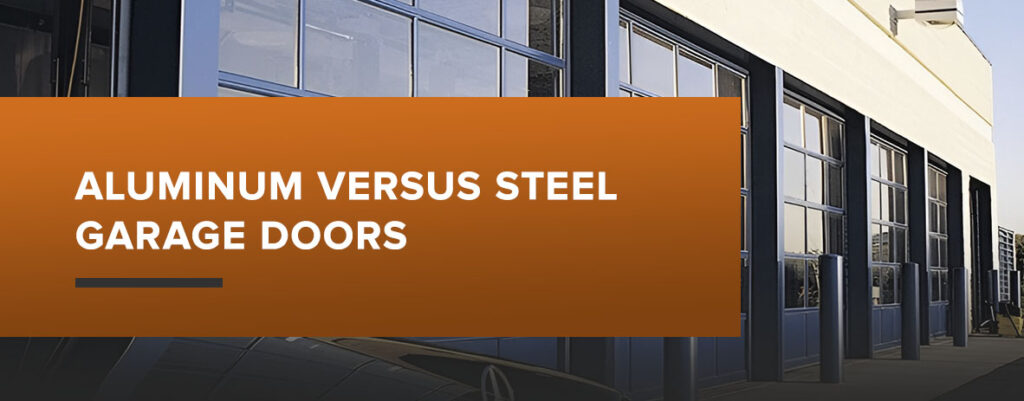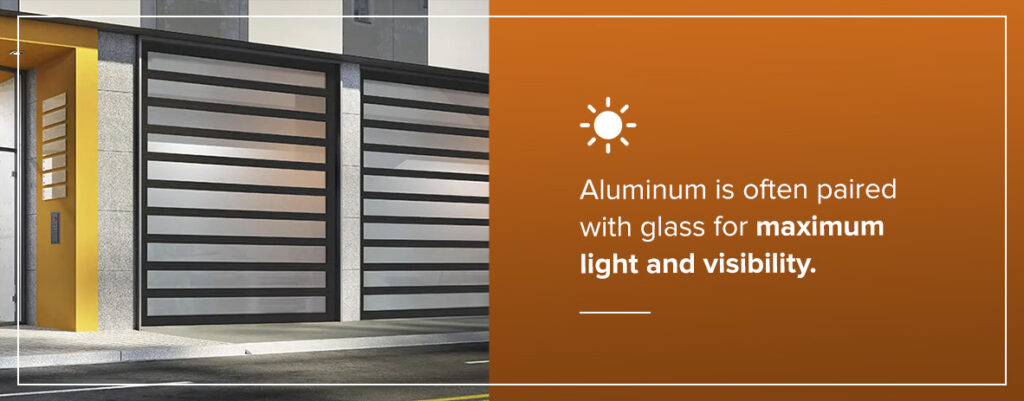
If you’re considering replacing your garage door or installing one for your client, you may be wondering about your options. After all, garage doors come in different materials that impact their qualities. When it comes to exceptional strength, durability and low maintenance, metal garage doors top the list.
On the market, however, the options for metal doors are steel and aluminum. While they are both metals, steel and aluminum are distinct with unique qualities, strengths and weaknesses. Our guide on aluminum vs. steel garage doors will help you determine the best door for your needs.
What Are Steel and Aluminum Garage Doors?
Steel garage doors are made from galvanized steel, which is notable for its excellent rust resistance. While steel can be heavy, the panel’s varying gauges help with balancing weight and durability. These qualities make steel garage doors desirable in terms of strength, durability and weather resistance.
Aluminum garage doors have some qualities that are similar to steel, such as strength and weather resistance. They also boast distinct features like light weight and corrosion resistance. Despite their differences, both metals come with modern qualities like energy efficiency, custom designs and noise reduction.
Pros and Cons of Steel Garage Doors
Here are some of the advantages and downsides of steel garage doors:
The Pros
Strength and durability: Steel is a robust metal with exceptional strength and can withstand harsh conditions associated with daily use. The metal’s toughness makes these garage doors resistant to general wear and tear, heavy impact, and rough weather. As a result, steel doors can endure years of use, often offering a long life span.
Low maintenance: Besides the annual servicing recommended for all garage doors, steel doors require minimal maintenance. Usually, all the door needs is occasional cleaning and lubrication.
Energy efficiency: Steel is one of the metals with low thermal conductivity, which means it can help retain cooler internal temperatures in summer by transmitting less heat. The same also applies in winter, as the door prevents excess heat loss. Aside from steel’s natural qualities that promote energy efficiency, insulated steel garage doors further contribute to energy savings.
Weather resistance: Steel garage doors can withstand extreme weather conditions without warping, breaking and cracking.
Rust resistance: Galvanized steel has a zinc layer that makes it resistant to corrosion and degradation caused by moisture damage.
The Cons
Weight issues: Steel is one of the heaviest materials used in constructing garage doors. Besides making garage door openers work harder, the weight can damage weaker frames.
Denting: Steel panels are vulnerable to denting, especially thinner gauges. Accidental bumps and impacts from hail and stones can create dents that are challenging to rectify without professional assistance.
Heat transfer: While steel has a low heat conductivity compared to many metals, its conductivity level is still good. If the outside temperatures are extreme, steel will transfer the heat into the garage unless the door has proper insulation.
Pros and Cons of Aluminum Garage Doors
Aluminum garage doors share some similarities and benefits with steel. Here is a breakdown of the pros and cons of aluminum garage doors:
The Pros
Lightweight: Aluminum is a lightweight metal, which makes it an excellent choice if you want a metal garage door that puts less strain on the door opener. It’s also the lightest metal garage door for manual operation.
Corrosion-resistant: Unlike steel, aluminum is naturally resistant to corrosion due to its reaction with oxygen, which forms a tough, non-reactive surface layer. Resistance to corrosion makes aluminum garage doors ideal in harsh environments.
Low maintenance: Like steel, aluminum garage doors require little upkeep. Occasional cleaning to remove dust and debris is generally enough.
Customizable: Aluminum is a highly customizable metal, which leads to versatile garage door options with unique features that match diverse architectural styles. Aluminum is often paired with glass for maximum light and visibility.

The Cons
Prone to dents: Metals are susceptible to dents from impact, and since aluminum is softer than steel, it’s easier to dent.
Low energy efficiency: Aluminum has low insulation properties, which makes it less energy-efficient unless the garage door is lined with insulation materials.
Heat sensitivity: Unlike steel, extreme summer heat can soften aluminum panels, making them more vulnerable to warping and denting.
Steel vs. Aluminum Garage Doors: Comparison
As you can see, steel and aluminum garage doors share many similarities and have a few unique qualities. But how do these qualities and strengths compare side by side? Here are some of the best qualities a garage door can offer and how both metals score for each:
Security Features
Steel is inherently strong, a trait that makes steel garage doors more robust and secure than aluminum. These doors are resistant to impact and can withstand brute force. As a result, they have a significant security advantage over their aluminum counterparts. Since aluminum is lightweight and malleable, it’s more likely to give in to forced entry.
However, both types of garage doors can be reinforced with other materials and fit with additional security features like locking mechanisms and smart technology to improve security.
Durability
Steel is generally considered more durable than aluminum due to its sheer strength and resistance to damage. However, other factors impact durability, such as corrosion and maintenance needs. Aluminum excels in both factors as it’s resistant to corrosion and doesn’t need frequent maintenance. As such, both materials have a reliable resistance to wear and tear.
Longevity
While both steel and aluminum garage doors offer durability, they differ in longevity based on their use and the environment. The toughness of steel doors makes them an ideal long-term option for heavy-use applications, but they may not fare well in rust-prone areas like coastal regions. Aluminum doors are a long-lasting solution where water damage and corrosion are a concern. However, since it’s softer than steel, the door may not last as long with heavy use.
Performance
Two of the key factors that impact performance are durability and ease of use. While steel offers superior strength and can withstand rough weather conditions, its weight makes it less efficient for daily operation as it strains the garage door opener. It’s also more challenging to operate manually.
Due to its softness, aluminum is less durable than steel. However, aluminum doors score high in terms of performance because they are lightweight, easier to operate and resistant to corrosion.
Fire Resistance
Today’s fire-rated garage doors are key to protecting lives and properties, but their level of fire suppression varies. Steel offers superior fire resistance because it has a higher melting point and doesn’t contribute to spreading the fire. Aluminum doors can also withstand heat but at lower temperatures than steel.
Choosing Between Steel and Aluminum Garage Doors
The choice between steel and aluminum doors largely depends on your preference, budget and environment. Whether you choose steel or aluminum garage doors, you’ll benefit from features unique to metal doors, such as durability, longevity and unparalleled performance.At Ben Druck Door, we carry commercial and residential overhead doors from top brands in the industry. We also provide installation and door maintenance services as well as a free consultation to help you make the best decision for your needs. Contact Ben Druck Door for a professional consultation and installation!


